McGuire Students Build the Future They Imagine
The entrepreneurship program is long on multidisciplinary collaboration, and the diversity enhances the career readiness of participants.
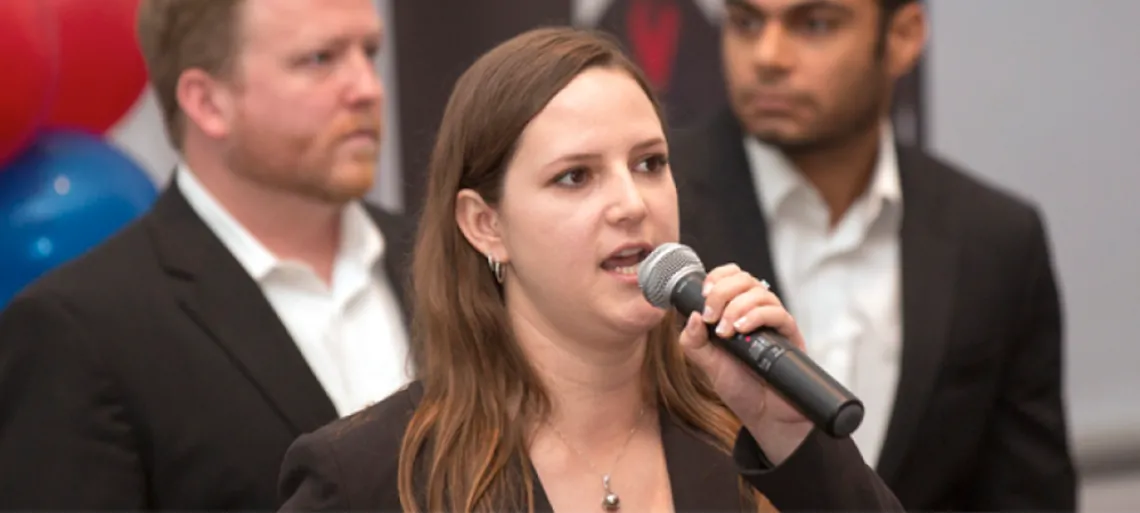
Brian Herrera was snowboarding in Colorado when he was overcome with the beauty of the scenery. The University of Arizona optical sciences and engineering major snapped photos from different angles, trying in vain to accurately capture the scene before his eyes. It was a photograph of the view reflected in his goggles that sparked his imagination.
"It was so beautiful and the photos were just not doing it justice," he said. "I thought it would be so cool to build a 3-D camera that could share in VR (virtual reality) so others could experience what my eyes were seeing."
Thanks to his major, Herrera understood how to tackle the complex challenge of building a 3-D camera. However, how to transition the concept into a viable business was not a challenge he understood, so he turned to the top-ranked McGuire Entrepreneurship Program in the Eller College of Management.
While not every such moment leads to an innovation, the McGuire program gives budding UA student entrepreneurs the ability to turn inspiration into reality. The program is multidisciplinary, open to UA undergraduate and graduate students from all fields of study. It annually accepts 80-90 students who form small new-venture teams and learn the principles of entrepreneurship through the hands-on process of taking an innovation from an early stage idea to a viable venture.
Herrera has teamed with marketing, finance and systems engineering students in the program to develop the commercial potential of the 3-D camera, which he is developing as an engineering senior design project thanks to a grant from the Thomas R. Brown Foundation.
"We’re making a wearable 3-D camera to replicate sensory data — the human experience — and hope to leverage it into a different type of immersive digital experience," he said.
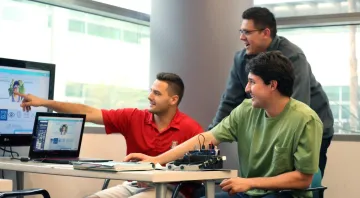
Projects Demonstrate Variety
Herrera is one of several engineering students who teamed up with other STEM, humanities and business students in the McGuire program this year to develop projects as varied as big-data analysis for social media engagement, VR-driven educational applications, biometric security systems, software for drone developers, commercialization of a drug to aid those suffering from Parkinson’s disease and more.
"We are teaching our students to understand the impacts they can make, and the McGuire program helps prepare them to solve challenges," said Jeff Goldberg, dean of the UA College of Engineering.
McGuire students own their own intellectual property, and Herrera already has applied for a provisional patent for his device. If he encounters any legal questions, students from the James E. Rogers College of Law will provide legal advice in a mock law-firm setting through the Business/Law Exchange, a partnership between the law college and McGuire.
McGuire new-venture teams are paired with experienced and successful entrepreneurship mentors-in-residence who meet with every team several times a week to provide individualized guidance. Throughout the year, students also are coached by communication mentors, connected with industry experts and given personalized feedback from angel investors.
"When you’re trying to do a project like this, it’s really important to have support, and the McGuire program is providing that," Herrera said.
McGuire students receive an "Engaged Learning Experience" notation on their transcript as part of the UA’s 100% Engagement initiative, which is based on the recognition that experiences beyond the classroom enrich students’ professional and personal growth.
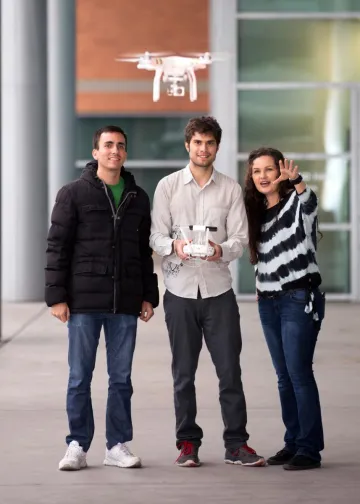
The experience is what attracted Rodrigo Savage, a doctoral student in electrical and computer engineering, to McGuire.
"The main reason I wanted to do the McGuire program is because it’s an interdisciplinary program," he said. "Anyone can participate and collaborate with other people with complementary skill sets."
While Savage was thrilled to team up with students with finance, management, communication and media know-how, the three M.B.A. students in his group benefit from having a teammate who can work directly on the technical side of their cutting-edge new venture.
"Our product is a standardized drone software development platform — basically a drone app store," Savage said. "We’re creating an API (application programming interface) so a drone software developer can program an app once, and we will make it available to multiple drone manufacturers."
Collaboration's Payoff
Students benefit from collaborating with peers in other fields of study, said Joseph Broschak, executive director of the McGuire Center for Entrepreneurship.
"The diversity of expertise our students bring to the McGuire program enriches everyone’s educational experience," Broschak said. "Welcoming students from all fields of study means our students are exposed to different ways of thinking, new methods of problem-solving, and a broader range of business ideas."
Ari Nicolini, a biomedical engineering doctoral candidate, formed a McGuire new-venture team with an M.B.A. student, an M.B.A./J.D. student and a doctoral candidate in pharmacy last year. Their concept, a website for renting personal goods, took second place at the year-end McGuire New Venture Competition.
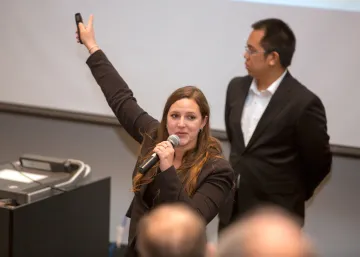
"I believe that our team diversity, coupled with the critical mentorship the program was designed to provide, led to our success at the end of the year in the NVC," said Nicolini, who has applied the $5,000 they won at the competition toward preparing the new-venture website for launch.
Nicolini has long been interested launching a startup in the biotech industry. Learning to put together a business plan and give concise, timed pitches was an eye-opening experience, she said.
"I knew regardless of what specific type of venture I participated in, I would still be able to learn the basic skills of company formation," she said. "It was a steep learning curve for someone with almost no knowledge about the business world coming into the McGuire program, but the close mentorship and team exercises exceeded expectations for preparing myself for a venture launch."
The McGuire Program isn’t a business incubator or accelerator focused on building innovations; it’s an academic program focused on creating innovators. By the time students complete the McGuire Program’s pioneering curriculum, they’re equipped to apply principles of entrepreneurship and innovation to any new venture or established business. About 30 percent of McGuire Program graduates do become entrepreneurs within five years of graduation, and many more start a business (or many) later in life.
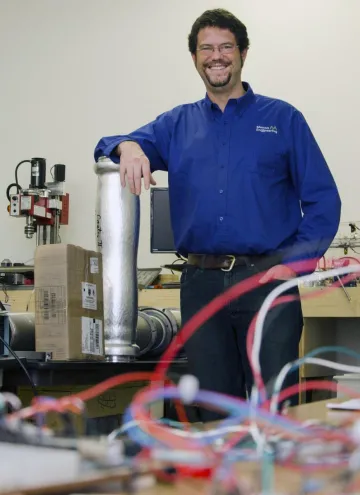
"There’s more of a push for students to be entrepreneurial these days," said Patrick Marcus, a 2006 graduate of the program. "The latest generation is thinking, I want to launch a startup, or I want to be a CEO."
That wasn't what Marcus was thinking when he began pursuing a doctorate in biomedical engineering, but he had some exposure to a startup environment and that led him to seek out more entrepreneurial training to fill in the gaps in his education. Once he enrolled in the McGuire Program, he quickly realized that technology and math are not the only important things in life.
"An engineer and a product are only a small part of a company and what you need for success," he said. "It doesn’t just matter how good of an engineer you are. It's equally important to be able to sell yourself, your project, and the importance of what you’re doing."
In 2011, after working at a startup for a few years, he founded Marcus Engineering, a Tucson-based electronics engineering firm primarily focused on electronics, product development, systems integration and medical instrumentation. He still uses the broader business and communications skill set that he learned in the McGuire Program every day.
"The most valuable and eye opening thing I learned in the McGuire Program was how people who are not engineers think about the world," he said. "It impacts my business decisions, my management of people, and how I acquire customers. I ask myself, 'What does the person across the table care about and how can I reach them?'"
Goldberg sees the McGuire Program as having an even greater impact on engineering students.
"Tomorrow, our students will be tackling the grand challenges that face our world: making solar energy cost-competitive with fossil fuels, engineering better medicines, providing access to clean water for nearly a billion underserved, ending extreme poverty and hunger, securing cyberspace, and advancing education through personalized learning for the generation that will build this next century," he said. "The McGuire Program helps our graduates be more fully prepared to solve these challenges and build the future they imagine."

